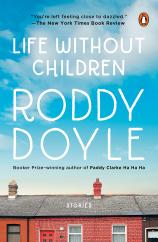Life Without Children: Stories
Review
Life Without Children: Stories
If a disease can be a literary character, that’s the role the coronavirus plays in Irish writer Roddy Doyle’s latest short story collection, LIFE WITHOUT CHILDREN. In 10 terse but empathetic stories, he interrogates the experiences of ordinary Dubliners during lockdown and the ways in which the pandemic that began in March 2020 insinuates itself into their unexceptional lives.
Many of the protagonists of Doyle’s stories resemble those in his 2011 collection, BULLFIGHTING --- men who have, as I wrote in my review, “reached the broad valley of midlife having played by a set of rules that promised at least contentment, if not happiness, and now feel betrayed by either ennui or strife in their personal relationships, stagnation in their jobs, and a sense that life isn't destined to improve any time soon.”
"The stories in LIFE WITHOUT CHILDREN are elegant miniatures of lives in extremis. With empathy, precision and humor, [Doyle] shows us how we endure, and often prevail, in even the darkest times."
One such character is Mick, from “The Charger,” who entertains paranoid fantasies that his wife and four daughters, all of whom have moved home during the pandemic, are plotting his demise. He has entered what his wife of three decades calls his “third age” and has “reached a point --- a plain. A plateau. After a lifetime of hard work.” His darkly comic musings over the means by which they might carry out this “assassination attempt” gradually give way to painful memories of a childhood scarred by the death of his father and how he invented stories to hide that anguish from his wife. “He was unloved, unlovable. Unwanted. That was who he was. What he was. What had happened.”
And that’s certainly true of Sam, the protagonist in the collection’s opener, “Box Sets,” one of only two stories over which “the Corona,” as some of the characters call it, doesn’t cast its shadow. Sam is unemployed, even as Ireland’s economy rebounds from the spectacular collapse of the Celtic Tiger and spends his free time binge-watching DVDs of “House of Cards,” “Breaking Bad” and “Mad Men,” passionately arguing their relative merits in a local pub. “Anger got him home. Blind fury got him home” after he is struck by a bicyclist while walking his dog, but by the story’s end he returns to consoling himself with a “future measured in box sets.”
Jim’s partner, Laura, leaves him the day before lockdown in “Gone.” “She wasn’t missing; she’d left. But I wondered if I was supposed to report it, anyway,” he muses. The story’s narrative trades the perspectives of the two characters as Doyle unpacks their lives, including a tragedy from Jim’s earlier marriage and the guilt that haunts him from that event and his rapidly shifting emotional weather as he ruminates over Laura’s departure.
Other stories in LIFE WITHOUT CHILDREN offer observant depictions of frayed marital relationships, as in the title story. Alan, in England as Ireland is shutting down, thinks of himself as a “sixty-two-year-old bachelor. With a wife. And she was a sixty-year-old spinster, with an occasional husband. They’d become brother and sister, somehow.”
But not all of the pairings are unhappy ones. In “Worms,” Joseph, another man in the “third age” who had been “miserable --- for years, before the lockdown,” is able to rekindle his love for his wife, Thelma, after the two of them begin compiling a Spotify playlist that’s an “earworm autobiography” of their lives during COVID. “Something had happened. They’d opened up to each other. He wasn’t sure why --- it made no real sense.”
“The Five Lamps,” which concludes the book on a strong note, follows an unnamed man who has traveled to Dublin, a city he despises, just as Ireland’s first lockdown begins. He’s blindly searching for his son, who left home at 17 and has been gone for more than four years. As he wanders the ghostly city like a modern-day Leopold Bloom, he’s the beneficiary of random acts of beneficence bestowed by a woman waiting to enter a methadone clinic, a young girl who sells him a sandwich at the railway station and a man delivering cakes there. “The city was kind,” he realizes as his search plods on. “He’d been wrong all along.”
A couple of these stories --- “Nurse,” a portrait of a woman reflecting on the final days of a COVID patient in her care, and “Masks,” about a man who feels “ripped from his life” during the second lockdown and whose compulsive walking culminates in an act of madness --- are more sketches than fully developed works. Even here, Doyle’s talent for illuminating his characters’ inner lives emerges. The stories in LIFE WITHOUT CHILDREN are elegant miniatures of lives in extremis. With empathy, precision and humor, he shows us how we endure, and often prevail, in even the darkest times.
Reviewed by Harvey Freedenberg on February 25, 2022
Life Without Children: Stories
- Publication Date: February 21, 2023
- Genres: Fiction, Short Stories
- Paperback: 192 pages
- Publisher: Penguin Books
- ISBN-10: 0593300580
- ISBN-13: 9780593300589




